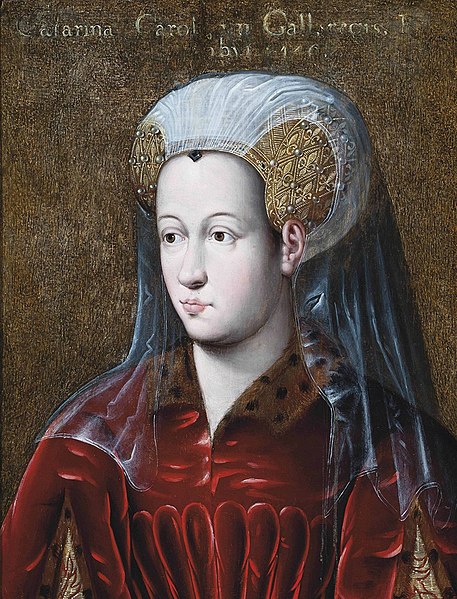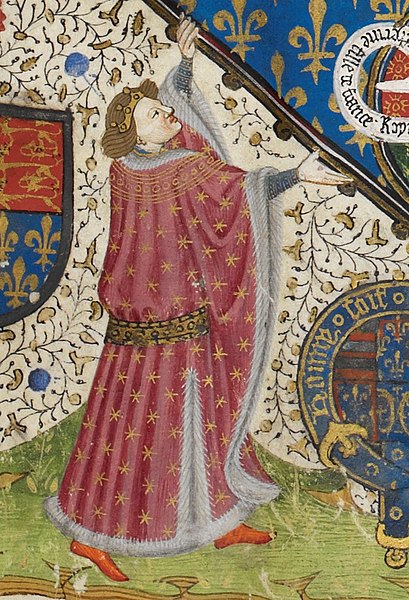 |
| Charlotte of Charolais |
A Death in the Family
On 13th
July 1446, at the age of thirteen, Charles became a widower. Catherine’s death
was partly caused by the local climate which was insalubrious[i]; the lowlands being damp
and cold which could have affected chest problems. Catherine suffered from fainting
fits brought on by coughing. Her health was also affected by the large amounts
of travelling required for those following the peripatetic Burgundian court on
its journeyings through Philip’s territories.
Charles and
Catherine had become friends and when Philip required Charles to attend him in
Arras and enter a jousting tourney there in the late spring of 1446 Isabella
and her entourage followed. Isabella wanted to protect her enthusiastic son
from himself. Charles was to spend his life unable to accept or understand his
own limits.
On the day
of the joust Catherine had to return to her apartments as she was too ill to
sit out in the cold misty air. Charles VII sent two doctors to restore his
daughter’s health and Catherine’s husband sat at his wife’s side and played the
harp to her, to no avail. Catherine died at about the age of eighteen.
Philip was a
soldier and not a diplomat; having been disappointed in his attempts at an
alliance with the French he finally gave Isabella free rein to extend the hand
of friendship to her English relations. Philip was interested in gaining official
confirmation for his imperial lands and seemed unaware of increasing French
determination to bring Burgundy completely under French rule. One of Isabella’s
aims was to set up a marriage for her son Charles with a member of the English
royal family.
The Queen’s Machinations
 |
| Richard, Duke of York |
Isabella
realised that she would have to work with the Duke of York, who was the heir to
the throne, in order to achieve a lasting relationship between Burgundy and
England. The main thorn in the package was Margaret of Anjou, still violently
opposed to all things Burgundian. Her marriage to Henry VI placed her in a
position where she could seriously hurt her enemy Philip and she was not afraid
to use her influence.
Henry VI was
very unlike his father; he’d grown up to become a quiet religious man who wanted
nothing more than peace. His wife was a fiery aggressive woman who can have
given him no peace at all[ii]. Richard of York, who had
governed England in his nephew Henry’s name, was removed from his post as
Lieutenant Governor of Normandy and transferred to the wilds of Ireland.
The English
court separated into anti and pro-Burgundian factions. Margaret was interested
in furthering her father’s prestige at the French court. The queen, along with
her allies the Marquess of Suffolk[iii] and the Earl of Somerset[iv], vied for power with the Duke of
York[v]. Isabella’s uncle Cardinal
Beaufort had retired from the political fray which meant that Isabella needed a
new source of gossip and support.
 |
| Humphrey, Duke of Gloucester |
The queen
and her allies were in the ascendant at court, although the marriage was not
popular amongst Henry’s subjects as the county of Maine had been negotiated away by Suffolk.
‘And thus the king of
England, Henry VI, granted and gave Maine and Anjou at the request of his queen
Margaret….and that aforesaid queen of ours begged the King of England that
[they] so be given to her father at the urging of William Pole [Suffolk].’[vi]
Margaret’s
coterie were soon able to remove another potential rival, the Duke of Gloucester[vii] who was arrested for treason on 20th
February 1447 and died mysteriously three days later.
A Burgundian Misstep
The Flemish
weavers were dependent on the English merchants selling good quality goods at
an acceptable price from the Staple at Calais[viii]. At the moment only
inferior grade wool was available for the Burgundians at prices that were far
from attractive. Isabella hoped to work with the English merchants to persuade
the Crown to change the rules and regulations governing the Staple.
 |
| Anthony, Grand Bastard of Burgundy |
In August 1446
the Burgundian representatives were able to sign a continuation of the
Anglo-Burgundian mercantile agreement extending the treaty until 1458. Isabella
spent the autumn in Coudenberg monitoring the factions in the English court. She
felt herself to be isolated and sought out the company of Anthony; the Grand
Bastard of Burgundy[ix].
Anthony joined with Isabella and Hue de Lannoy preparing plans to persuade
Philip to revoke his prohibition against the transportation of English cloth
throughout Burgundy.
With
Gloucester dead and when her Uncle Beaufort died in April 1447 and with the
Duke of York in Ireland, Isabella found herself short on allies and information
from the English court. Philip’s imposition of a further 5% tax on English wool
coming from Calais only exacerbated the situation.
Burgundian
merchants in London were attacked and Henry VI had to place them under his own
protection. At the same time, he needed to protect his lands in Normandy from
French attack[x],
‘Four armies converged on
the duchy from the east, south and west. King Charles attached himself to the
eastern one, commanded by Dunois[xi],
and directed on the capital [Rouen]….the
mob so worked on Somerset that he weakly allowed the archbishop to
negotiate for a surrender.’[xii]
War in Burgundy
It took
Isabella until the spring of 1451 to persuade the merchants of the Staple to
lower their prices and to pay 16,000 gold saluts[xiii] as an indemnity payment
in return for an exemption from duty on wool and cloth in Burgundy.
.jpg/396px-Simon_de_Lalaing_(1405-1477).jpg) |
| Simon de Lalaing |
When Philip
amassed his troops outside the walls of Ghent he was infuriated to find the
gates of his city closed against him. All his men in the city were executed,
runners were sent to neighbouring towns for support and the government was
closed down. On 30th March 1452 Philip declared war on one of his own possessions and laid waste to the
land thereabouts.
‘Considering the obstinacy
and continuing wickedness of the Ghenters….we have summoned some of our noble
vassals and loyal subjects from around here….to reduce them to obedience and
humility towards us with God’s help.’[xiv]
Isabella’s
journey from Brussels to Bruges was across war-torn countryside. Not long after
arriving in Bruges Isabella was informed that Oudenaarde, one of Ghent’s
allies, had been taken by Simon de Lalaing[xv]. The men of Ghent responded by
attacking Oudenaarde and besieged it for two weeks, threatening to kill
Lalaing’s two sons. Philip’s armies, one from Seclin and the other from Grammont, raised the siege. Philip attacked Ghent twice in May and
other towns allied with Ghent were attacked.
The
townspeople of Ghent turned to Charles VII as Philip’s overlord; he was only
too happy to interfere in Philips’ affairs. He sent envoys to arrange peace
between the two belligerents. One of Charles’ demands was that Philip return of
the towns of the Somme valley to France.
Bibliography
The Hundred
Years War – Alfred Burne, Folio Society 2005
The Reign of
Henry VI – RA Griffiths, Sutton Publishing Ltd 1998
Europe:
Hierarchy and Revolt 1320-1450 – George Holmes, Fontana 1984
The
Fifteenth Century – EF Jacob, Oxford University Press 1997
Margaret of
Anjou – Helen E Maurer, Boydell Press 2003
Isabel of
Burgundy – Aline S Taylor, Madison Books 2001
Philip the
Good – Richard Vaughan, Boydell Press 2014
Charles the
Bold – Richard Vaughan, Boydell Press 2002
www.wikipedia.en
[iii]
William de la Pole had been upgraded in rank from Earl to Marquess in 1444 as a
result of the successful negotiations for the Anglo-French marriage of which he
had been the main proponent. He would later be made Duke of Suffolk
[iv]
Edmund Beaufort was made Duke of Somerset in 1448
[vi]
Margaret of Anjou - Maurer
[vii]
Another of the king’s uncles
[viii]
The designated Staple port
[ix]
Unlike other courts, in Burgundy the bastard children of the ruler were treated
very much as the legitimate children were; the boys had careers and the girls
were married off. Isabella was on good terms with many of Charles’ half
siblings. Anthony received an official salary of 3,840 crowns per annum worth in 2015 the relative: historic standard of
living value of that income or wealth
is £2,741,000.00 labour earnings of that
income or wealth is £22,610,000.00 economic status value of
that income or wealth is £93,890,000.00 economic power value of that income or wealth is £1,748,000,000.00 www.measuringworth.com. Anthony went on to serve Charles after their
father died.
[x]
The French invaded Normandy in early November 1447 and took Rouen on 10th.
[xi]
Half-brother of Charles of Orléans
[xii]
The Hundred Years Way - Burne
[xiii]
On the assumption that a salut was roughly worth the same as a guilder, pound
or livre this would be worth in 2015 the relative: historic standard of
living value of that income or wealth
is £11,710,000.00 labour earnings of that
income or wealth is £91,260,000.00 economic status value of
that income or wealth is £393,800,000.00 economic power value of that income or wealth is £7,418,000,000.00 www.measuringworth.com
[xiv]
Philip the Good - Vaughan
[xv]
Admiral of Flanders
No comments:
Post a Comment
Note: only a member of this blog may post a comment.